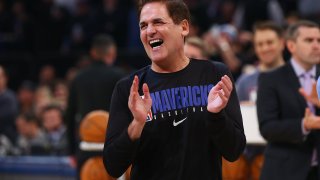
It is no secret that Americans need to be taught financial literacy while they are young. Financial education has the ability to change people's lives, but too often people receive inadequate education or no education at all.
April is Financial Literacy Month and CNBC Invest in You is featuring weekly lessons from highly regarded business figures on building a better relationship with money, which Ariel Investments' Mellody Hobson recently noted is the longest relationship you will have in your adult life.
Dallas Mavericks owner and billionaire investor Mark Cuban wants people to avoid using credit cards. It is his first piece of financial advice: stop using them, and it is nothing new from the "Shark Tank" investor who has in the past lamented his poor management of credit cards in his younger years.
We're making it easier for you to find stories that matter with our new newsletter — The 4Front. Sign up here and get news that is important for you to your inbox.
Credit card debt increased during the coronavirus crisis as 51 million people added to their balances. Credit cards are an expensive way to borrow, with the average interest rate at 15.99%.
While it sounds obvious, Cuban also warns against spending more than you earn. Undisciplined spending with a credit card can lead to high-interest debt.
And he said people should invest in their understanding of finance. "If you don't understand finance it is awful hard to know what you are doing."
Money Report
Ray Dalio bought his first stock for under $5 with money he earned from caddying. Unsurprisingly, at least based on what we now know about his success, Dalio was able to triple his investment. Despite not having a lot of money to invest, nor a sophisticated understanding of markets, Dalio invested in shares of a company worth less than $5.
From that point on Dalio , who has built the world's largest hedge fund at Bridgewater Associates, was "hooked" on investing.
Dalio's early start in investing helped him learn. His suspicion was that the stock market would offer higher returns over time and he was correct. The S&P 500 has historically returned around 6% per year.
During the 1960s, America experienced a devastating loss. Their arch rivals, the Soviet Union beat them into space with the Soviet's Sputnik program.
Determined to pass their competitors, America began to realize it would need to unleash its full capacity, which included overhauling the education system. Students would be taught about science and technology just like Soviet children.
Nathalie Molina Niño, Managing Director at Known Holdings, a financial services platform and author of Leapfrog, says America needs to shift the curriculum again to fight the wealth and income gap
Only 21 states require personal finance coursework to graduate high school, with just a handful mandating a stand-alone class, according to the Council for Economic Education
The American dream is a story of shared success, according to NYSE President Stacey Cunningham.
"Financial literacy is such an important part of that so investors know how to take advantage of opportunities that are out there for them."
Whether it is preparing for retirement or paying down debt, being financially literate allows people to take calculated risks that can lead to success.
Former chairman of the Securities and Exchange Commission Jay Clayton understands how life-changing education on investing and personal finance can be.
"In modern society, if you are not educated about credit, savings and investment you will not make good decisions."
Bad financial decisions, just like good financial decisions, can compound, making it harder to achieve financial success. One way to avoid making the wrong decisions, according to Clayton, is to educate yourself: "The earlier you're educated the better your decisions the better your outcomes."
SIGN UP: Money 101 is an 8-week learning course to financial freedom, delivered weekly to your inbox.
CHECK OUT: 'You should always invest in a Roth IRA,' says accountant: It's the 'Holy Grail' of retirement accounts via Grow with Acorns+CNBC via Grow with Acorns+CNBC.
Disclosure: NBCUniversal and Comcast Ventures are investors in Acorns.






